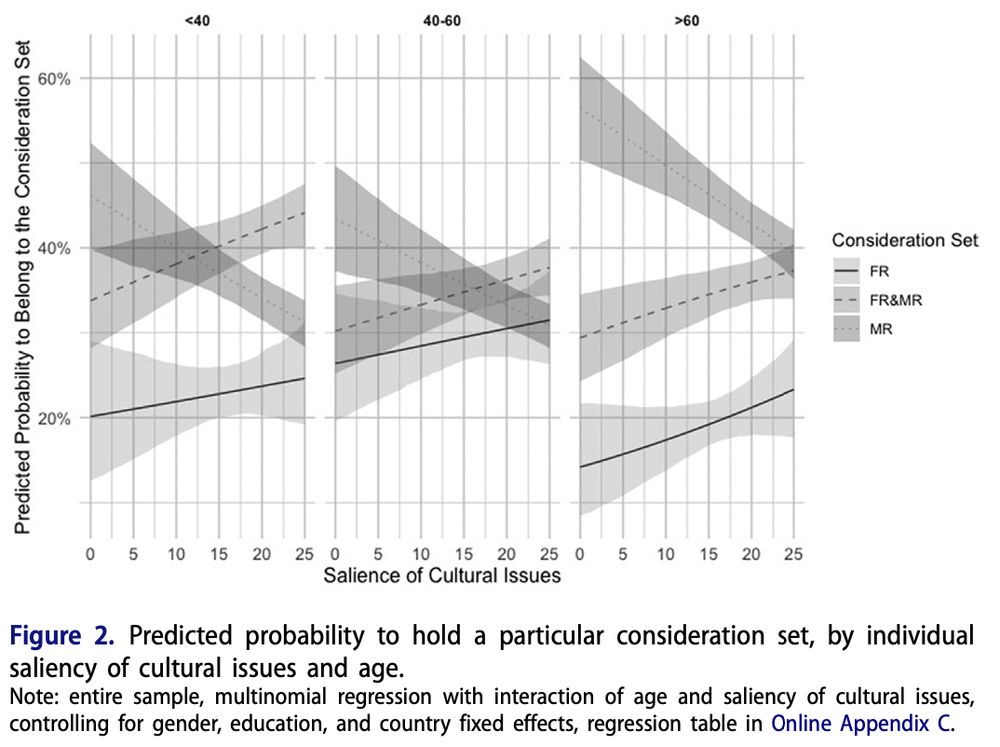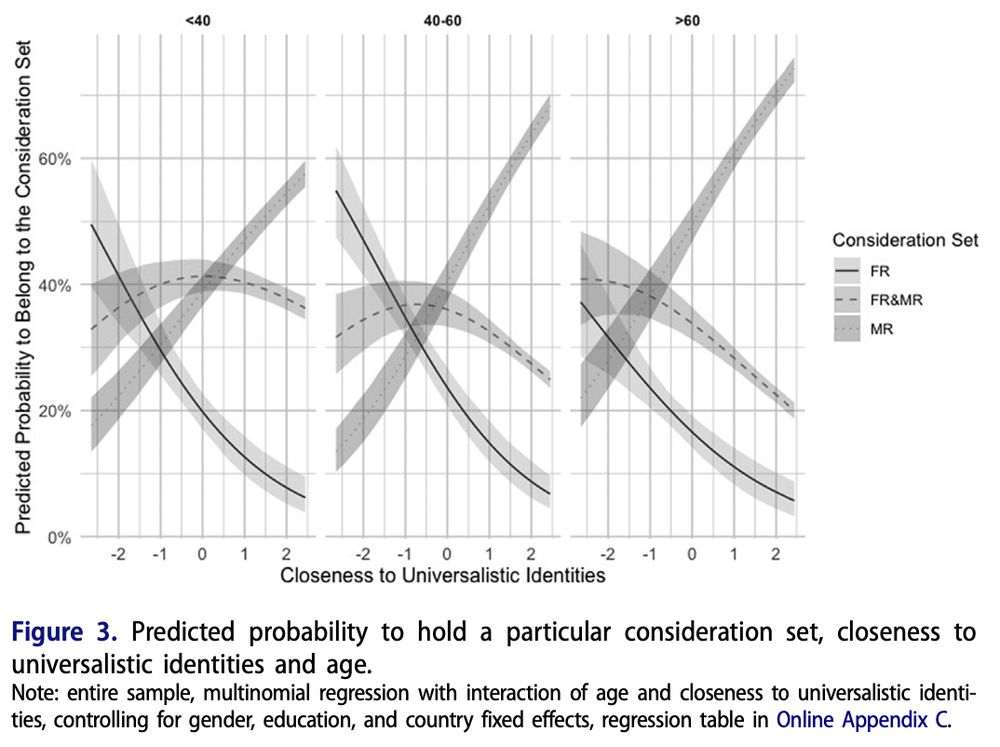PhD Prep Talk: Switzerland
Meet an EUI Researcher and alumnus from your country!
Share widely with your students in Switzerland 🇨🇭thinking about a PhD @eui-eu.bsky.social
𝗢𝗻𝗹𝗶𝗻𝗲 𝗘𝗨𝗜 𝗣𝗵𝗗 𝗣𝗿𝗲𝗽 𝗧𝗮𝗹𝗸 🇨🇭
21 Nov 2025 | 2:30pm CET
@alissasiara.bsky.social introduces the program & life at EUI, I share my experience, and we answer your questions.
👉 Register: www.eui.eu/events?id=58...
05.11.2025 12:14 — 👍 27 🔁 24 💬 2 📌 0
@dpzollinger.bsky.social and I are thrilled "Cleavage Politics in Western Democracies" is out as an SI at @wepsocial.bsky.social!
Its papers explore the foundations of the cleavage pitting new left against radical right parties, and how it compares to the classic cleavages of Lipset & Rokkan:
🧵⬇️
07.10.2025 11:27 — 👍 118 🔁 57 💬 4 📌 8
Congratulations!
06.10.2025 15:00 — 👍 1 🔁 0 💬 0 📌 0
Looking back to some excellent panels and fruitful discussions with colleagues and friends at #ecprgc25 in vibrant Thessaloniki!
02.09.2025 16:16 — 👍 5 🔁 0 💬 1 📌 0
LinkedIn
This link will take you to a page that’s not on LinkedIn
📄 🚨 New Research on Polarization, Fragmentation, and Democracy in @democratization.bsky.social
Nils-Christian Bormann and I explore the impact of ideological polarization and fragmentation on the democratic systems of interwar Europe: lnkd.in/erjJr9qF
#polarization #democracy #data #history (1/4)
22.08.2025 11:59 — 👍 16 🔁 8 💬 1 📌 0
Thank you for organizing!
29.08.2025 13:08 — 👍 1 🔁 0 💬 0 📌 0
Join us for the presentation “Perceived Group Representation as an Indicator of Cleavage Formation”, co-authored with @siljahausermann.bsky.social and @dpzollinger.bsky.social in the fantastic POVB @ecprpovb.bsky.social panel “New Dimensions of Political Cleavages”, #ecprgc25, Wednesday 8.30-10.15!
26.08.2025 09:02 — 👍 5 🔁 3 💬 0 📌 0
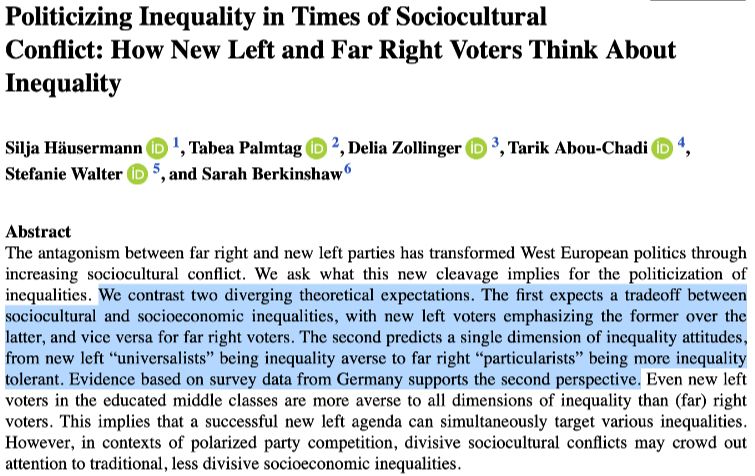
Even in times of sociocultural conflict, a progressive left electorate is more averse to sociocultural *and* socioeconomic inequalities than (far) right voters.
New paper with @siljahausermann.bsky.social Palmtag @tabouchadi.bsky.social @stefwalter.bsky.social Berkinshaw
tinyurl.com/d42wyb79
1/n
29.07.2025 12:19 — 👍 89 🔁 32 💬 4 📌 1
This study is part of the excellent special issue on ‘Updating Cleavage Theory for the 21st century” that @davidattewell6.bsky.social and @dpzollinger.bsky.social
have edited with @wepsocial.bsky.social
🙏
7/7
08.07.2025 11:10 — 👍 3 🔁 0 💬 0 📌 0
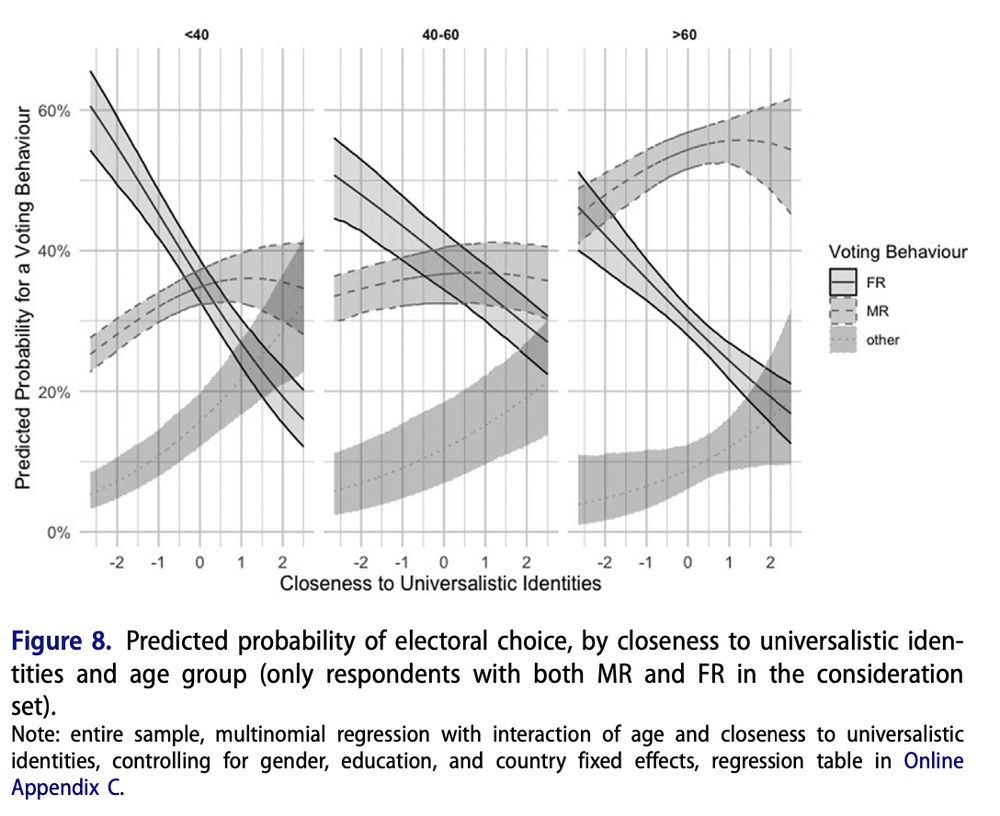
However: Voters in the right field with less particularistic group identities continue to opt for the mainstream right, suggesting that accommodating the far right would likely entail additional losses for mainstream right parties.
6/7
08.07.2025 11:08 — 👍 3 🔁 0 💬 1 📌 0
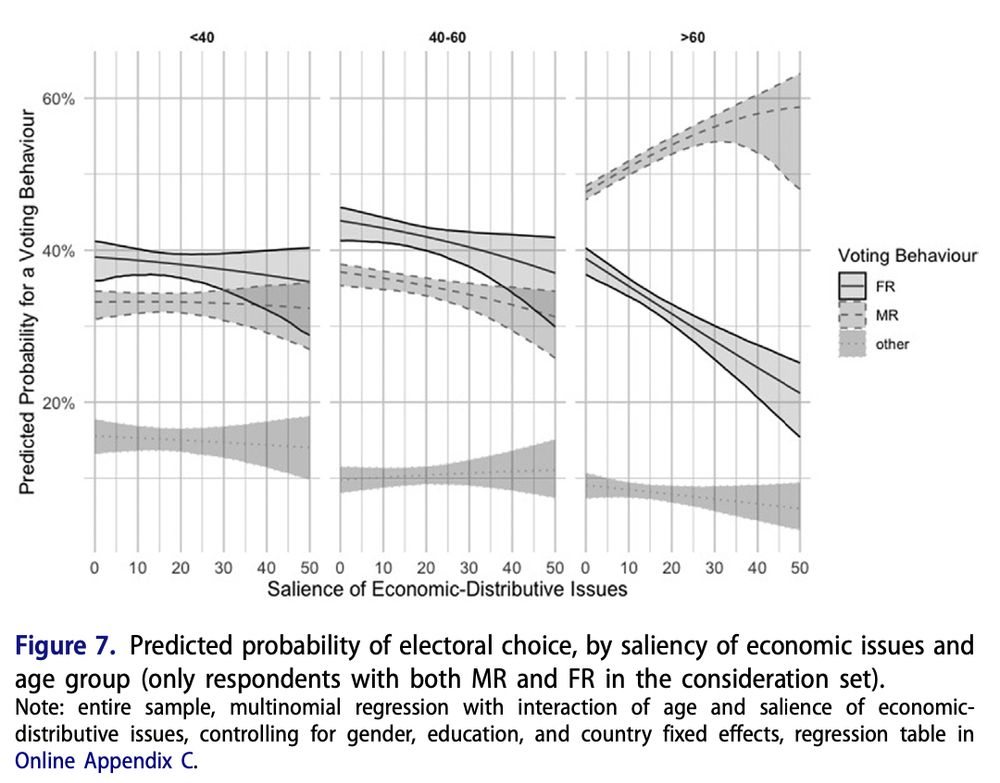
And among those voters who hold BOTH far and mainstream right parties in their consideration set, how salient economic-distributive issues are to them (relative to socio-cultural questions) explains actual choice only among the elderly.
IOW: the segmentation of the right field is eroding.
5/7
08.07.2025 11:07 — 👍 2 🔁 0 💬 1 📌 0
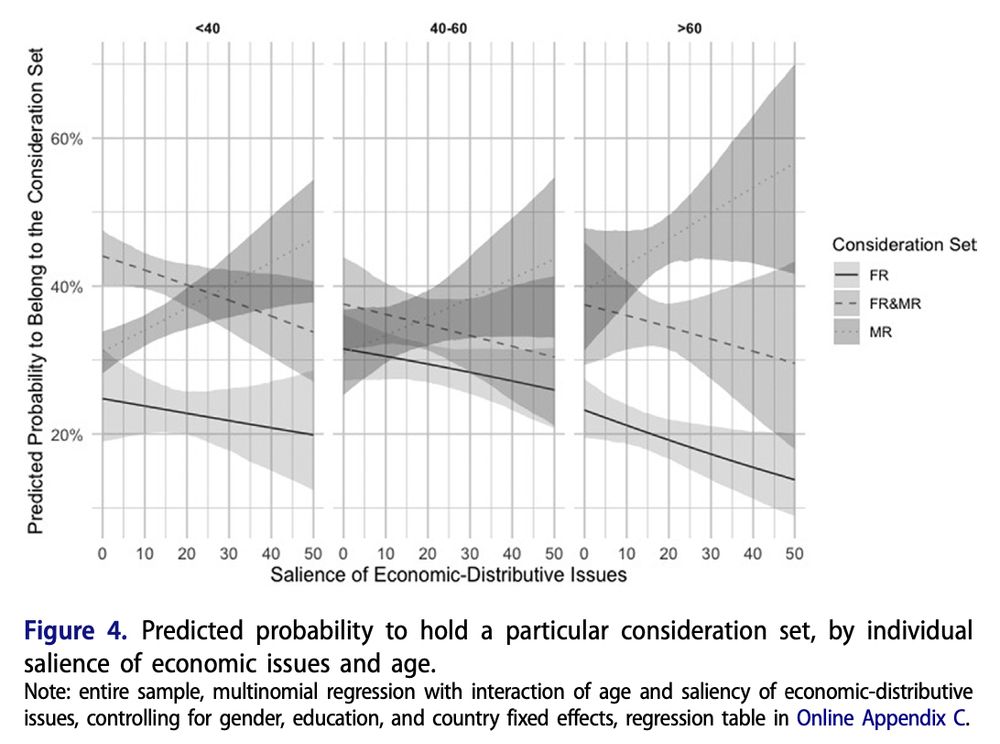
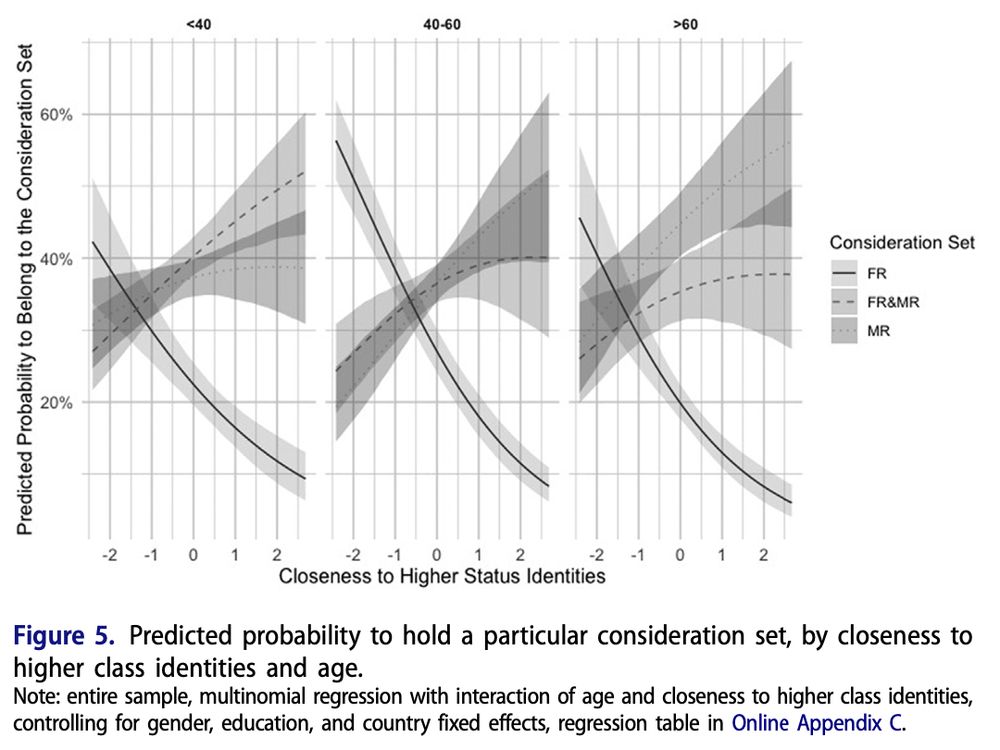
More surprisingly – and reason to worry for these parties – the mainstream right has lost its dominant position even among those younger voters…
• for whom economic-distributive issues are most salient and…
• who hold higher social status identities.
4/7
08.07.2025 11:06 — 👍 3 🔁 0 💬 1 📌 0
What explains whether right-wing voters consider voting for
• only the mainstream right
• only the far right
• or both?
Using original survey data, we study how saliency, attitudes and identities relate to consideration sets and vote choice.
Important finding: the findings vary by age groups.
2/7
08.07.2025 11:05 — 👍 1 🔁 0 💬 1 📌 0
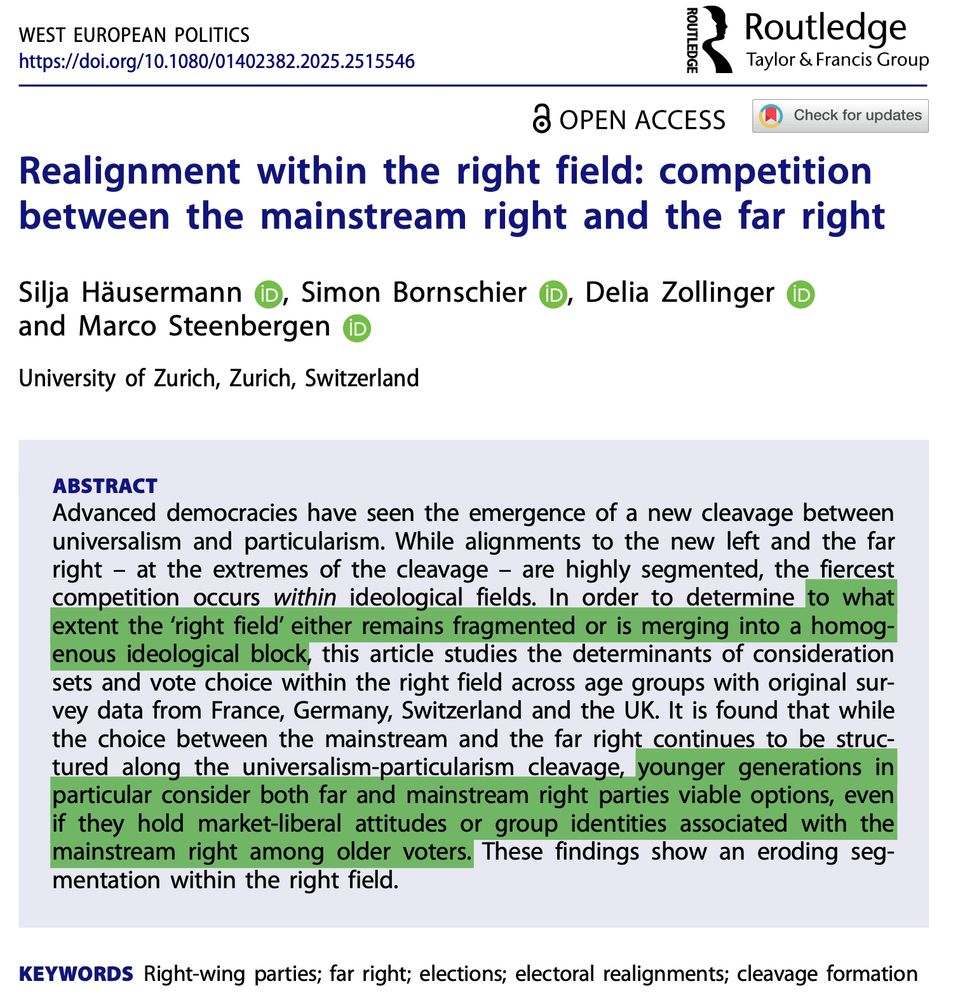
How much competition within the right field?
❗Segmentation is eroding, especially among young voters❗
New article out by @siljahausermann.bsky.social @dpzollinger.bsky.social
@mrsteenbergen.bsky.social and myself
@ipz.bsky.social @wepsocial.bsky.social
tinyurl.com/ycxfx2aj
A short 🧵
1/7
08.07.2025 11:04 — 👍 53 🔁 13 💬 1 📌 1
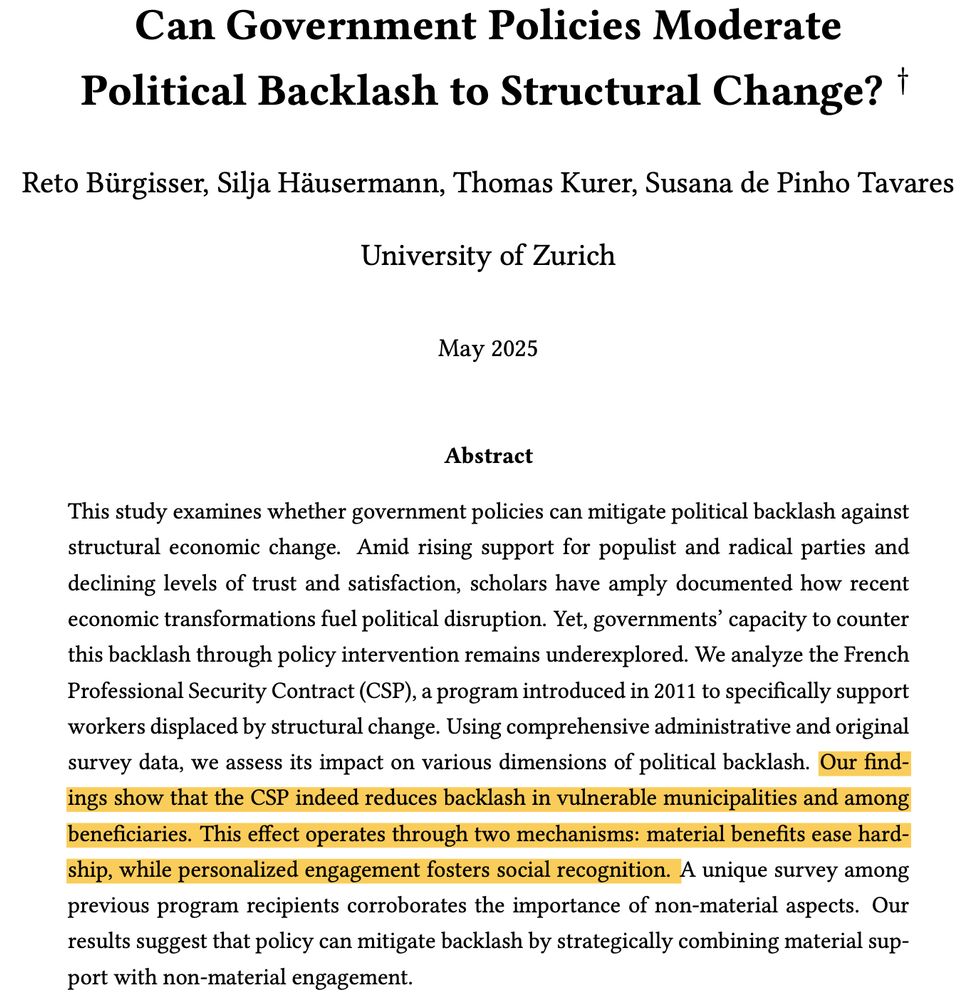
Can government policies moderate political backlash to structural change?
Yes, the effect operates through material benefits and social recognition.
🚨New WP by @retobuergisser.bsky.social, @siljahausermann.bsky.social, @thmskrr.bsky.social and @susanadptavares.bsky.social 🚨
shorturl.at/zFbZE
04.06.2025 08:01 — 👍 131 🔁 43 💬 3 📌 2
New publication in @wepsocial.bsky.social with @retobuergisser.bsky.social, @siljahausermann.bsky.social, and Michael Pinggera. We map the welfare preferences of voters at the poles of the second, GALTAN dimension of political conflict. 🧵
04.03.2025 18:05 — 👍 61 🔁 21 💬 2 📌 0
Not sure if the world is paying attention—Switzerland is small (though economically powerful). But while other Western leaders sharply criticized VP JD Vance’s speech at the #MSC / in Munich, the current Swiss president largely approved it, interpreting it as „a plea for direct democracy“ polisky
15.02.2025 17:37 — 👍 40 🔁 15 💬 7 📌 3
An excellent analysis by Steven Levitsky & Lucan Way on the prospects for democracy in the US under Trump II, with a lot of comparative insight. A sobering view, yet underlining that polarization may not only be a danger, but paradoxically also a safeguard for liberal democray.
14.02.2025 17:55 — 👍 1 🔁 0 💬 0 📌 0
🚨 Job Alert! 🚨
I’m looking for a postdoc to join my Emmy Noether project on the New Climate Divide! 🌍
🔍 It is a 3-year position with a likely extension for another 3 years & no teaching obligations
📄 Check out the job call: uni-heidelberg.de/md/politik/p...
Thanks for sharing! 🤝
15.01.2025 12:37 — 👍 112 🔁 110 💬 3 📌 2
This is also an amazing tool for tracking the social identities parties (try to) tap into! Typical voters are not identified by political profiles but via brands, bands, lifestyles,... Ping
@dpzollinger.bsky.social @simonbornschier.bsky.social @siljahausermann.bsky.social @magneflemmen.bsky.social
14.02.2025 08:33 — 👍 26 🔁 3 💬 1 📌 0
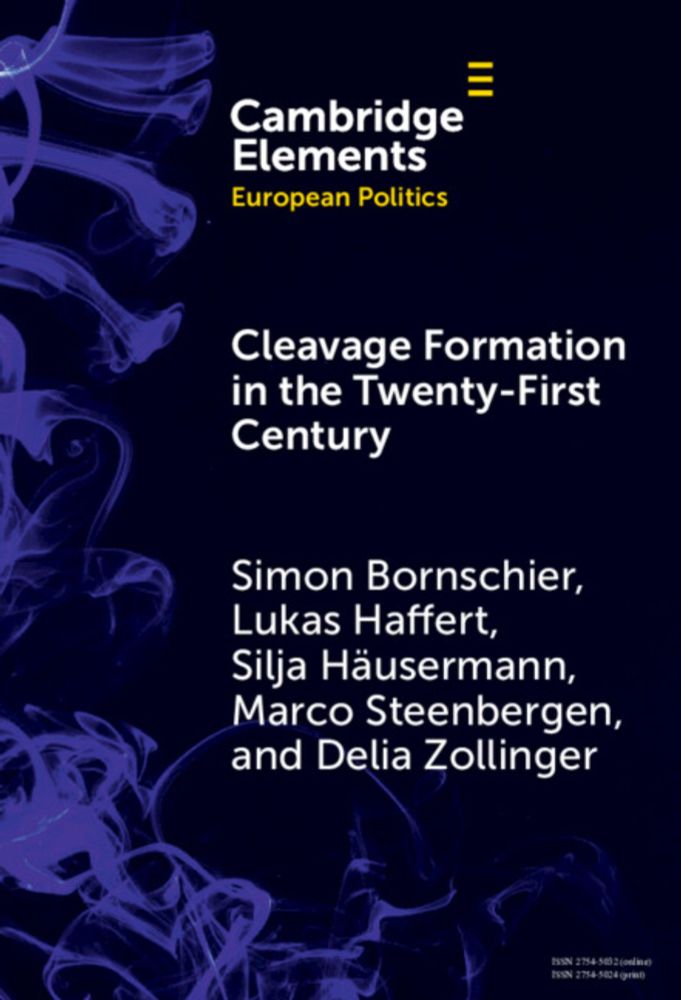
Cleavage Formation in the 21st Century
Cambridge Core - European Studies - Cleavage Formation in the 21st Century
We @dpzollinger.bsky.social @mrsteenbergen.bsky.social @siljahausermann.bsky.social @lhaffert.bsky.social @simonbornschier.bsky.social are happy to see this come out.
A warm thank you to all those who provided feedback!
The book is #OpenAccess at cup.org/3ZLtQ0o
8/8
07.02.2025 09:07 — 👍 3 🔁 0 💬 0 📌 0
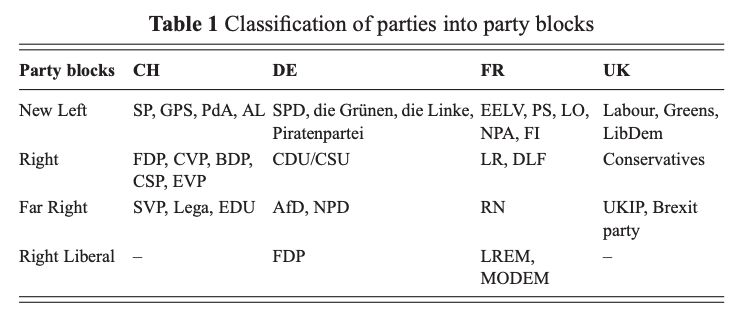
Party systems have undoubtedly become more volatile and fragmented. Seeing the underlying stability in political behavior and the similarities across countries it produces requires focusing on voter alignments to ideological blocks, rather than individual parties.
7/8
07.02.2025 09:05 — 👍 3 🔁 0 💬 1 📌 0
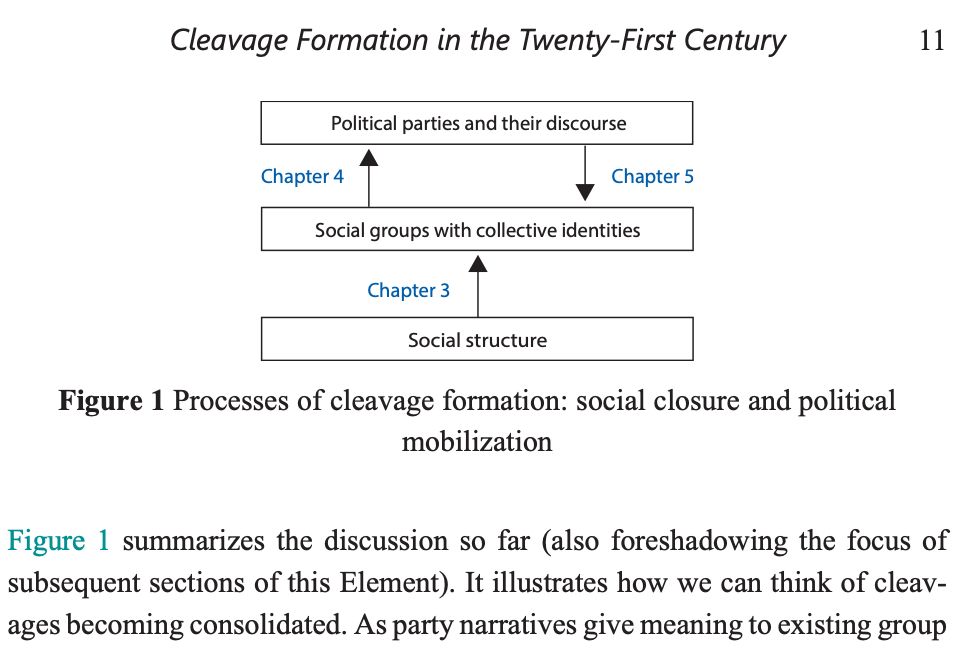
But when parties talk about issues related to the universalism-particularism cleavage (for example, gender equality, LGBTQI+ rights, immigration, or the EU), they speak to group identities that are widely shared in certain social structural groups.
6/8
07.02.2025 09:05 — 👍 3 🔁 0 💬 1 📌 0
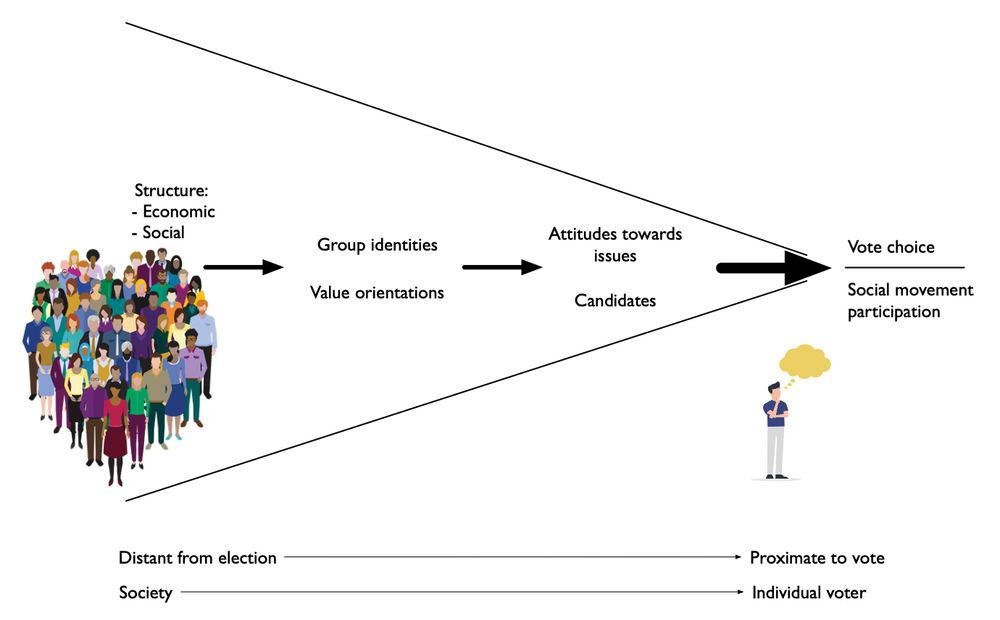
We started out with a puzzle: Political sociology shows that party preferences remain firmly anchored in social class, urban-rural residency, and, above all, education. Yet parties rarely appeal to these groups directly nowadays, and political behavior appears rather individualistic.
5/8
07.02.2025 09:05 — 👍 3 🔁 0 💬 1 📌 0
Is politics driven overwhelmingly by short-term strategies, populism, and issues like immigration? Or is there an underlying stability in terms of a structurally rooted conflict (aka a cleavage) between universalism and particularism? We believe our evidence supports the latter view.
4/8
07.02.2025 09:04 — 👍 2 🔁 0 💬 1 📌 0
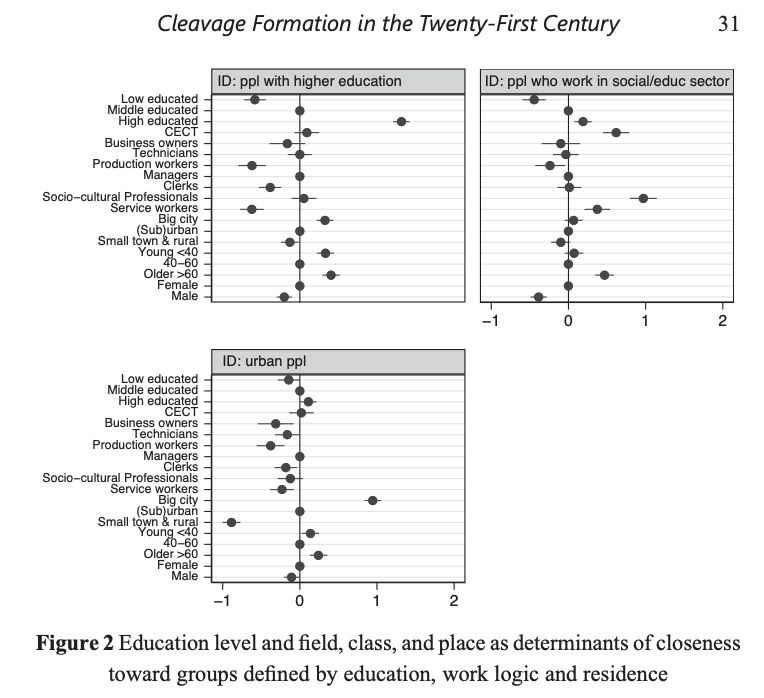
Yet, these identities do have structural roots, just like class identities did in the past.
3/8
07.02.2025 09:04 — 👍 1 🔁 0 💬 1 📌 0
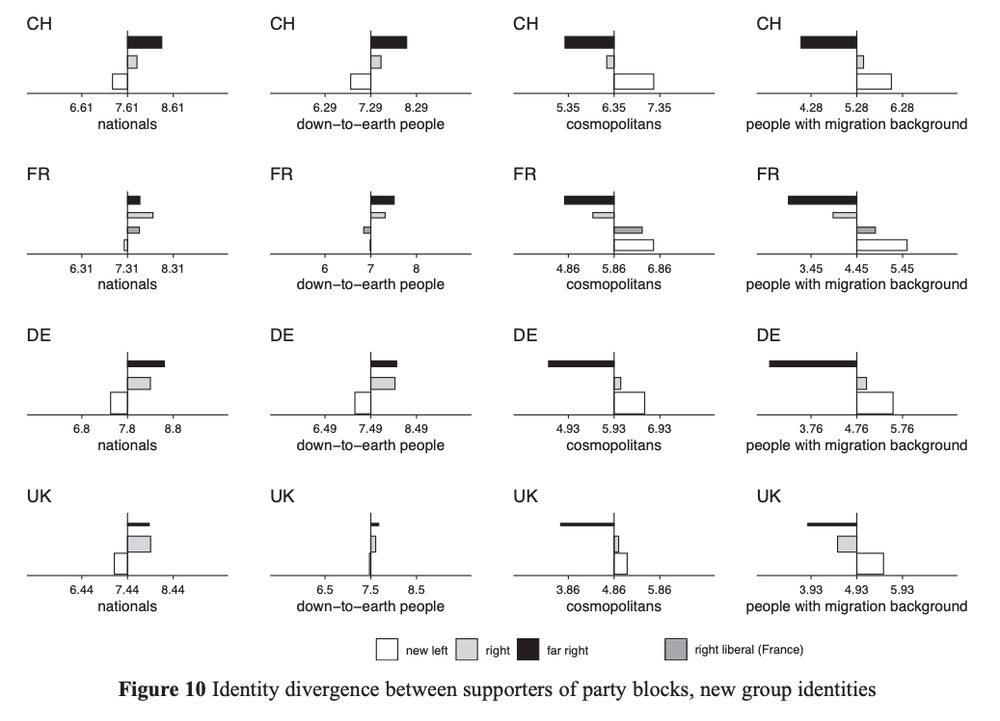
Today, feeling close to cosmopolitans or feminists separates voters of the New Left from those of the Far Right who identify with people who are down to earth and hard working. Our evidence is based on original surveys fielded in four West European countries.
2/8
07.02.2025 09:03 — 👍 1 🔁 0 💬 1 📌 0
How do voters navigate fragmenting party landscapes with parties behaving in an ever more strategic matter? In this short CUP book, we suggest that group identities mediate the link between social structure and ideological party blocks.
1/8
07.02.2025 09:02 — 👍 46 🔁 16 💬 1 📌 1
#MSCA #PhD Candidate @vortex-europe.bsky.social
Research Assistant, Faculty of the European Studies, UBB,Cluj.
#PolSci #MainstreamRight #FarRight #Parties #Radicalization #Europe
@forum-midem.bsky.social
@tudresden.bsky.social
culture and computational social science
finding my footing in political polarization research
Comparative political scientist @ Humboldt University Berlin | inequality, redistribution, social policy | www.beckerbastian.net
The Center for Comparative and International Studies (CIS) is the fruit of collaboration between two leading houses of political science, namely the ETH Zurich and the Institute of Political Science at UZH.
👩🔬Political scientist at Uni Stuttgart working on democratic preferences, identity, deliberation.
✨Fan of pop culture, books, feminism, food, fun facts and social media if it works again 🙏
Postdoc at @sotonpolitics.bsky.social | Visiting Fellow @lse-ei.bsky.social | interested in political participation, democratic theory, and European politics | https://paul-kindermann.net
Postdoctoral Researcher & @MZES University of Mannheim
National Identity Research | Political Behaviour | Data Harmonisation
She/her
Postdoctoral Researcher at ULB| Adjunct Professor of Political Science at LUISS
Research on cleavage politics, voting behaviour and public opinion, populism, radical right, political geography
Political scientist
WZB Berlin Social Science Center/FU Berlin
Web: http://saldiviagonzatti.com/
CIS at @ethz.ch | I study historical political economy and political behaviour—especially identity, culture, and social norms.
Professor of political science, Sciences Po, Cevipof, Paris - Voting behaviour - Political representation - Electoral systems
Professor sociology and social data science @KULeuven
PhD Candidate @Harvard Gov. Political Economist researching on the politics of opportunity. Credit Access, Education, and Labor Market policy in US, Germany, and Japan + affects on global financial stability. On the market.
https://www.danieltroberts.com/
Associate Professor of Political Science at Luiss, Rome. Author for Routledge and Palgrave. Cleavages, elections, new parties, party system change, technocracy, party competition, and voting behavior. Personal views only.
Research Fellow @hait-tud.bsky.social | Researching: right-wing extremism👌 music 🎸political violence 👊💣football history ⚽|
MA Political Science Student at University of Zurich
Full Professor @UniKonstanz. Interested in social cohesion, norms, and stereotpyes. Ballett aficionada
PhD candidate in Political Science at Uppsala University.
Gender & Politics • Political Psychology • Group Identities • Experiments • Computational Methods • Digital Communication
Professor of Political Science, University of Muenster | passionate about researching democracy, political conflict, radical right parties, EU politics, public policy - and about baking bread








